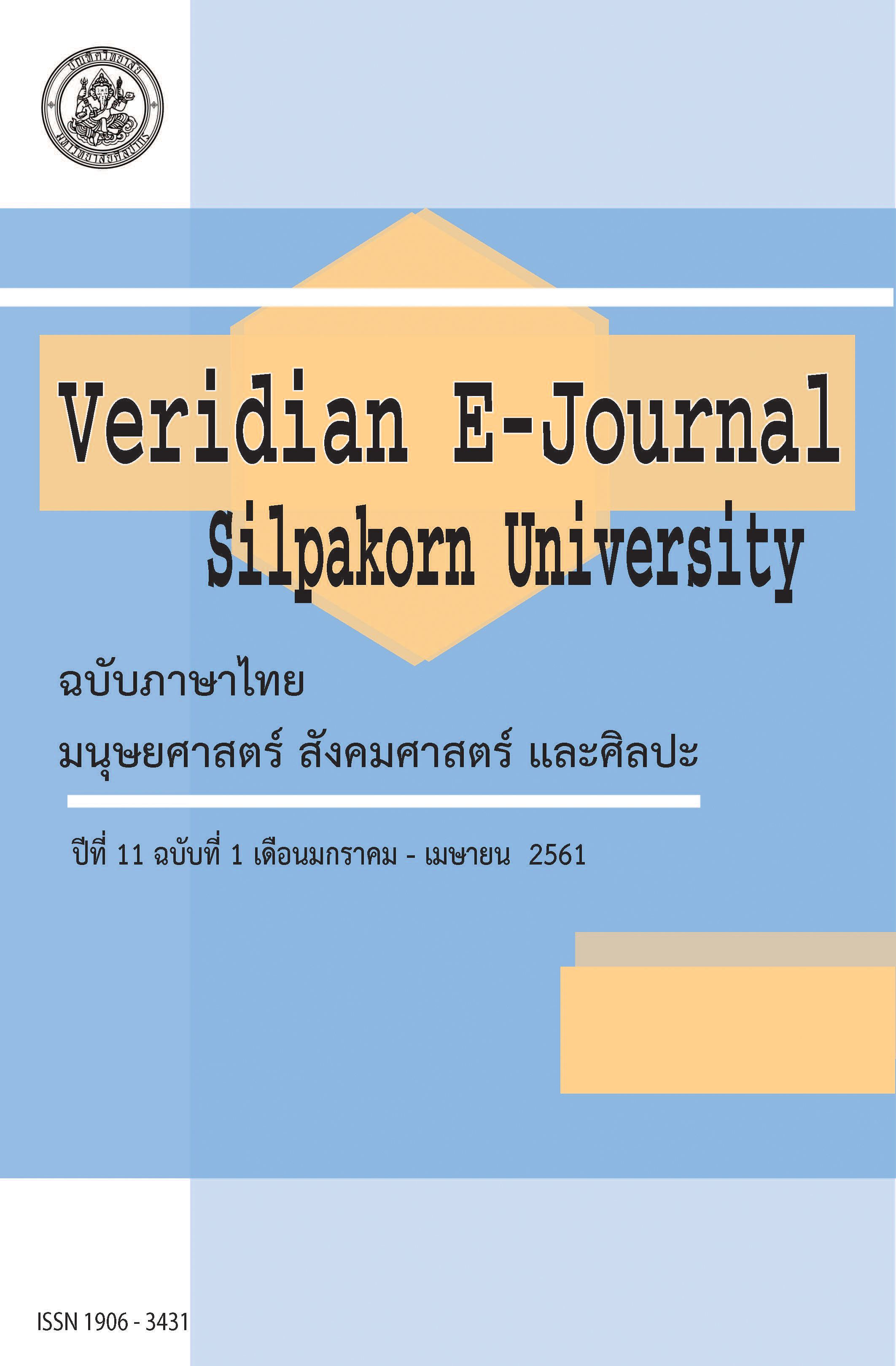การศึกษาการยืดเสียงพยัญชนะซ้ำในคำภาษาอังกฤษของคนไทย (An Exploratory Study of Thai Natives’ Gemination in English Words)
Main Article Content
Abstract
บทความวิชาการนี้มุ่งนำเสนอเรื่องการออกเสียงยืดเสียงพยัญชนะซ้ำ(gemination)ของผู้เรียนชาวไทยเวลาออกเสียงคำในภาษาอังกฤษ เนื่องจากการออกเสียงยืดเสียงพยัญชนะซ้ำนี้เป็นลักษณะที่พบทั่วไปในภาษาไทย เช่นคำว่า สมมติ /sommut/ และ คันนา /kanna:/ ดังนั้นผู้เรียนชาวไทยจึงอาจจะมีการออกเสียงที่มีลักษณะเช่นเดียวกันเมื่อเห็นคำภาษาอังกฤษที่มีลักษณะดังกล่าว คือมีรูปพยัญชนะซ้ำเรียงต่อกัน เช่น happy และ runner โดยออกเสียงเป็น /hæppɪ/ และ /rʌnnər/ ตามลำดับ ในความเป็นจริงแล้วลักษณะเสียงประเภทนี้ไม่ปรากฏเท่าใดนักในภาษาอังกฤษทั้งในระดับคำและระหว่างคำ และหากจะมีการยืดเสียงพยัญชนะซ้ำในบางคำหรือบางกรณี เสียงที่ยืดออกมาก็จะมีระยะเวลาเพิ่มขึ้นเพียงเล็กน้อย อีกทั้งการออกเสียงแบบยืดและไม่ยืดเสียงพยัญชนะซ้ำไม่ส่งผลต่อความหมายแต่ประการใด ประเด็นที่น่าสนใจคือการเข้าใจและการออกเสียงยืดพยัญชนะซ้ำของผู้เรียนชาวไทยจะก่อให้เกิดปัญหาในการสื่อสารหรือไม่โดยเฉพาะเมื่อผู้เรียนชาวไทยฟังเสียงที่เจ้าของภาษาเปล่งออกมาซึ่งไม่ตรงกับที่ตนเองรับรู้และเข้าใจ การศึกษาครั้งนี้จึงขอนำเสนอประเด็นนี้ในหลากหลายด้านเริ่มตั้งแต่สืบค้นข้อมูลด้านเสียงนี้ในทางสัทศาสตร์ที่เกี่ยวข้องกับภาษาอังกฤษและภาษาไทยโดยตรง ถกประเด็นการสอนเรื่องการออกเสียงที่สัมพันธ์กับประเด็นนี้ของคนไทย และผู้เขียนได้ทำการทดสอบในเบื้องต้นว่าเจ้าของภาษากับผู้เรียนชาวไทยออกเสียงแตกต่างกันจริงหรือไม่โดยใช้โปรแกรม Praat วิเคราะห์ข้อมูล อีกทั้งมีการทดสอบผู้เรียนชาวไทยว่าสามารถฟังเจ้าของภาษาเข้าใจหรือไม่เวลาที่เจ้าของภาษาออกเสียงแบบเป็นธรรมชาติโดยไม่มีการยืดเสียงยัญชนะซ้ำ หรือในบางบริบทมีการยืดเสียงพยัญชนะซ้ำแต่น้อยมาก ทั้งนี้ผู้เขียนได้เสนอแนะแนวทางการสอนการฝึกการออกเสียงที่เกี่ยวกับประเด็นทางเสียงนี้ไว้ในตอนท้ายด้วย
This article concerns itself with Thai students’ geminated sounds in English pronunciation. Just as their mother tongue, i.e. Thai extensively contains this phonological feature e.g. สมมติ /sommut/ and คันนา /kanna:/, they tend to pronounce English counterparts such as happy /hæppɪ/ and runner /rʌnnər/ in a similar way. In general, English does not have gemination at word and inter-word levels. Even though gemination occurs in certain cases, native English speakers tend to degeminate it, and the meanings of words with germination and degemination are not contrastive. The central issue then lies in whether such transfer will trigger communication problems in Thai students, especially when their perception and practice is not exactly the same as the actual pronunciation of English native speakers. Therefore, this study will address this problem in a more comprehensive approach by giving literature of gemination in English and Thai in particular, discussing its place in English classrooms, and carrying out a preliminary test to investigate the differences between the two nationalities’ pronunciation. Praat is used to identify such minute differences. The Thai subjects were also tested as to whether or not they understood the native speakers’ pronunciation without gemination or with degemination. Discussions and pedagogical implications are given in the final section of the paper.

